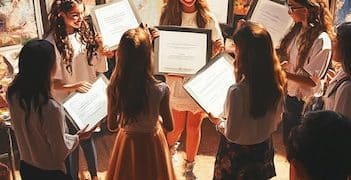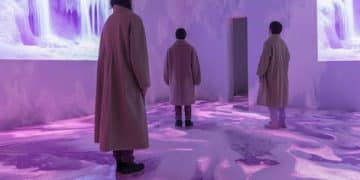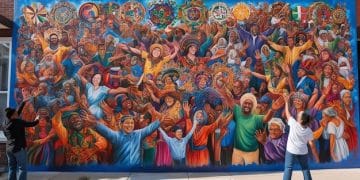The Art of Storytelling: 5 Literary Festivals Celebrating Diverse Voices in 2025
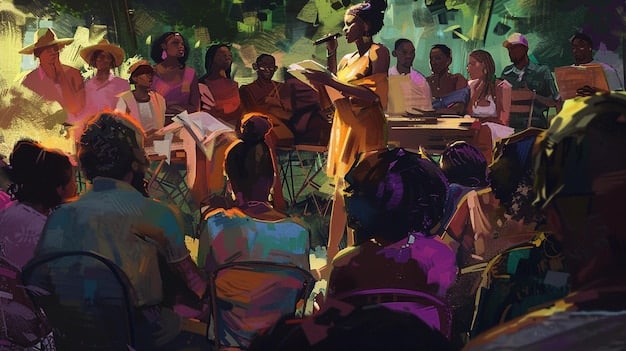
Advertisements
The art of storytelling transcends cultural boundaries, with literary festivals serving as vital platforms for celebrating diverse voices and narratives, offering unique opportunities for engagement and discovery in 2025.
The **Art of Storytelling: Exploring 5 Literary Festivals Celebrating Diverse Voices in 2025** offers a unique lens through which to view the evolving landscape of literature. These events, far from mere gatherings, are vibrant hubs where imagination thrives, ideas are exchanged, and the rich tapestry of human experience is woven into compelling narratives.
The Enduring Power of Storytelling in a Changing World
Storytelling, an intrinsic part of human civilization, continues to evolve, adapting to new mediums and voices while retaining its fundamental power to connect, educate, and inspire. In an increasingly complex world, stories provide a crucial framework for understanding diverse perspectives and fostering empathy across cultures.
The landscape of literature is constantly shifting, with a growing recognition of the need for narratives that reflect the varied experiences of people from all walks of life. This push for inclusivity goes beyond simple representation; it delves into the nuances of cultural identity, historical context, and personal journeys.
The Digital Age and Narrative Accessibility
The advent of digital publishing and online platforms has democratized storytelling, allowing more voices to emerge from previously unheard communities. This expanded accessibility means that literary festivals, once predominantly Western-centric, are now actively seeking out and showcasing authors whose works challenge traditional narratives.
- Digital platforms offer new avenues for emerging writers to share their work globally.
- Online events and virtual attendance expand the reach of literary festivals beyond geographical limits.
- Social media facilitates direct engagement between authors and their audiences.
Yet, amidst this digital expansion, the tactile experience of a book and the communal energy of a live literary event remain irreplaceable. Festivals provide a physical space for meaningful interactions, robust discussions, and the unique magic of shared literary passion.
Ultimately, the enduring power of storytelling lies in its ability to bridge divides, challenge preconceptions, and illuminate the shared human condition through diverse narrative lenses. These festivals are not just about books; they are about conversation, connection, and collective growth.
Curating Voices: The Criteria for Selection at Leading Festivals
The process of selecting authors and programming events for literary festivals is an intricate art form, balancing established literary figures with emerging talents and ensuring a true reflection of diverse voices. Curators meticulously weigh artistic merit against cultural relevance, seeking narratives that resonate with contemporary audiences and push boundaries.
A key aspect of this curation involves actively seeking out authors from underrepresented backgrounds, including those from marginalized communities, different linguistic traditions, and varied geographical locations. This intentional inclusion enriches the festival’s offerings and provides a platform for voices that might otherwise be overlooked in mainstream publishing.
Beyond Bestsellers: Discovering New Literary Landscapes
While bestsellers often draw large crowds, leading festivals are increasingly committed to introducing readers to authors whose work is groundbreaking, experimental, or addresses crucial social issues. This commitment fosters an environment of discovery, encouraging attendees to explore literary landscapes beyond their usual reading habits.
- Emphasis on literary quality, originality, and thematic depth.
- Inclusion of debut authors and those published by independent presses.
- Focus on works that tackle complex or controversial subjects with nuance.
The selection committees often comprise a diverse group of literary experts, including authors, critics, academics, and publishers, ensuring a well-rounded and informed decision-making process. Their collective expertise helps identify works that are not only compelling but also contribute significantly to the broader literary conversation.
Moreover, festival curators often consider the potential for interactive programming, such as workshops, panel discussions, and Q&A sessions, that can deepen the audience’s engagement with the selected works and authors. The goal is to create an experience that is both intellectually stimulating and personally enriching.
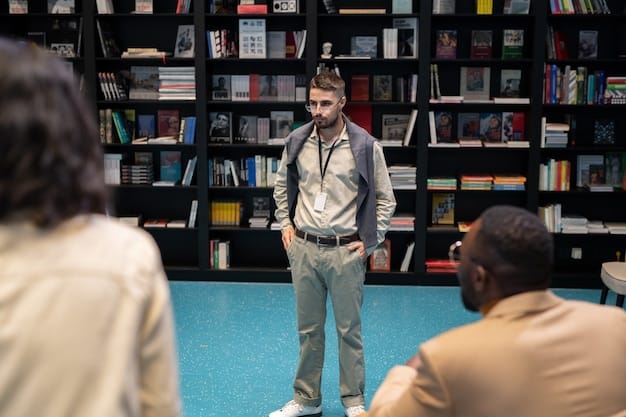
Exploring 5 Literary Festivals Celebrating Diverse Voices in 2025
As we look ahead to 2025, several literary festivals stand out for their unwavering commitment to celebrating a wide array of voices, pushing the boundaries of what stories are told and who tells them. These events are not just places to hear celebrated authors; they are vibrant ecosystems fostering dialogue, discovery, and community for readers and writers alike. Each festival has a unique character, reflecting the cultural tapestry of its location while maintaining a global perspective on literature.
1. The Diverse Narratives Literary Festival (Brooklyn, NY)
Scheduled for early spring, the Diverse Narratives Literary Festival in Brooklyn has quickly established itself as a beacon for contemporary and experimental literature. Its focus is explicitly on authors from marginalized communities, including but not limited to BIPOC writers, LGBTQ+ voices, and creators with disabilities. The festival prioritizes discussions that explore identity, social justice, and the power of narrative as a tool for change. Expect a dynamic program of readings, workshops on inclusive writing, and candid conversations about the future of publishing.
2. The Global Voices Book Fair (London, UK)
Taking place in the vibrant cultural hub of London, the Global Voices Book Fair is a truly international event. While based in the UK, its programming casts a wide net, inviting authors from across continents to share their work. The fair emphasizes literature in translation, making previously inaccessible narratives available to a wider audience. Special attention is given to authors from emerging literary scenes and those whose work challenges Western-centric views of storytelling. Attendees can look forward to multilingual readings, translation workshops, and panels on literary diplomacy.
3. The Indigenous Storytellers Summit (Santa Fe, NM)
Held against the stunning backdrop of Santa Fe, New Mexico, the Indigenous Storytellers Summit is dedicated to celebrating and preserving the rich literary traditions of Indigenous peoples. This festival provides a vital platform for Native American, First Nations, and other Indigenous authors to share their stories, spoken word, and poetry. Beyond readings, the summit often includes traditional storytelling circles, cultural performances, and workshops focused on revitalizing Indigenous languages through literature. It’s an immersive experience that highlights the profound connection between land, language, and narrative.
4. The Speculative Fiction & Futures Fest (Austin, TX)
The Speculative Fiction & Futures Fest in Austin, Texas, carves out a unique niche by focusing on science fiction, fantasy, and other speculative genres through a lens of diversity. This festival champions authors who use fantastic worlds and futuristic scenarios to explore complex social issues, alternate histories, and diverse identities. They actively seek out writers who challenge genre norms and weave in elements of cultural heritage from non-Western traditions. Attendees can anticipate groundbreaking discussions on world-building, ethical considerations in technology, and the role of speculative fiction in imagining more equitable futures.
5. The Children’s & Young Adult Lit Fest for Empathy (Seattle, WA)
In Seattle, the Children’s & Young Adult Lit Fest for Empathy is dedicated to fostering understanding and compassion through stories aimed at younger readers. This festival meticulously curates authors and illustrators whose works promote themes of diversity, inclusion, empathy, and global citizenship. It’s a family-friendly event with interactive storytelling sessions, workshops for budding writers, and panels for educators and parents on how to use literature to discuss complex topics with children. The festival believes that diverse narratives at a young age are crucial for shaping future generations of compassionate and broad-minded individuals.
These five festivals represent just a snapshot of the dynamic literary landscape in 2025, each contributing significantly to the ongoing conversation about the importance of diverse voices in storytelling. They collectively demonstrate a commitment to pushing boundaries, fostering inclusivity, and enriching the global literary community.
Innovations in Festival Programming and Engagement
Literary festivals are continually evolving, moving beyond traditional author readings and panel discussions to offer more immersive and interactive experiences. The goal is to deepen audience engagement and create memorable encounters that foster a lasting love for literature and storytelling in all its forms.
One significant innovation is the integration of multidisciplinary arts. Festivals might feature collaborations between authors and musicians, visual artists, or even chefs, bringing stories to life through varied sensory experiences. This interdisciplinary approach broadens the appeal of the festival and opens up new avenues for creative expression.
Hybrid Models: Bridging Physical and Digital Spaces
Post-pandemic, many festivals have adopted hybrid models, combining in-person events with robust online programming. This not only increases accessibility for a global audience but also allows for participation from authors who might not be able to travel. Live streams, virtual Q&As, and exclusive online content have become staple offerings, ensuring that the spirit of the festival reaches far beyond its physical location.
- Virtual author tours and digital book launches.
- Interactive online workshops and masterclasses.
- Archived content and on-demand access to event recordings.
Another area of innovation lies in community-specific programming. Festivals are increasingly partnering with local schools, libraries, and community centers to bring literary events directly to neighborhoods, ensuring inclusivity and reaching audiences who might not typically attend a large-scale festival. This localized approach helps to cultivate a love for reading and writing at a grassroots level.
Furthermore, many festivals are leveraging technology to enhance the attendee experience. Mobile apps provide real-time schedules, venue maps, and personalized recommendations. AI-driven tools might even suggest sessions based on a user’s stated interests, optimizing their festival journey and ensuring they discover relevant authors and topics.
These innovations in programming and engagement underscore a commitment to making literary festivals more dynamic, accessible, and responsive to the diverse needs and interests of the modern reader.
The Impact of Literary Festivals on Cultural Exchange and Understanding
Literary festivals serve as crucial conduits for cultural exchange, fostering understanding and empathy across national and social boundaries. By bringing together authors and readers from diverse backgrounds, these events create unique spaces for dialogue, challenging preconceived notions and promoting a more nuanced global perspective.
The exchange of ideas at these festivals extends far beyond the stage. Informal conversations in corridors, during book signings, or over coffee can be just as impactful, allowing participants to share personal stories and insights that contribute to a richer collective understanding. This human-to-human interaction is vital in an increasingly fragmented world.
Fostering Empathy Through Shared Narratives
Perhaps the most profound impact of literary festivals is their ability to foster empathy. When readers engage with narratives from cultures different from their own, they gain insights into alternative ways of thinking, feeling, and experiencing the world. This exposure can break down stereotypes and build bridges of understanding.
- Stories introduce readers to different social customs and traditions.
- Narratives provide context for historical events and political landscapes.
- Character perspectives help in understanding varied emotional responses and motivations.
Moreover, these festivals often feature sessions dedicated to translation, highlighting the immense effort and artistic skill involved in bringing a story from one language to another. This sheds light on the work of translators as cultural ambassadors, emphasizing their role in facilitating cross-cultural literary experiences.
Beyond individual encounters, literary festivals can also have a significant impact on national and international literary scenes. They provide platforms for international publishers and literary agents to discover new talent, thereby contributing to the global dissemination of diverse voices and stories. This, in turn, helps to diversify publishing landscapes worldwide.
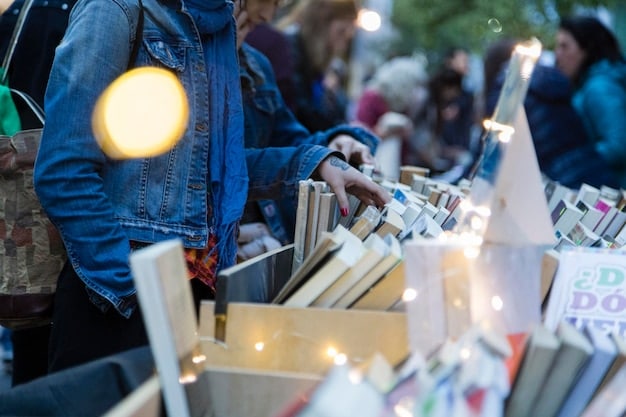
Ultimately, literary festivals are more than just celebrations of books; they are celebrations of humanity’s shared stories and the myriad ways in which we make sense of our world. They are powerful engines for cultural exchange, helping to build a more connected and empathetic global community.
The Future of Storytelling: Accessibility, Technology, and Inclusivity
The future of storytelling is intrinsically linked to advancements in accessibility, the innovative integration of technology, and a persistent drive towards greater inclusivity. As society continues to evolve, so too must the narratives we consume and the platforms through which we access them. Future literary events will likely push these boundaries even further, striving for a truly global and equitable literary ecosystem.
Accessibility, in its broadest sense, means breaking down barriers—physical, economic, and linguistic—to ensure that stories reach every potential reader and that every potential storyteller has a platform. This includes creating content for visually impaired readers, providing translation services for multilingual audiences, and ensuring venues are physically accommodating for all attendees.
Technological Horizons: AI, VR, and Interactive Narratives
Technology is set to play an even more transformative role. While concerns about AI-generated content persist, the potential for AI as a tool for translation, content recommendation, and even assistive writing remains significant. Virtual Reality (VR) and Augmented Reality (AR) could offer immersive storytelling experiences, allowing readers to step into narrative worlds like never before.
- AI tools for personalized reading recommendations and genre discovery.
- VR experiences that transport readers into story settings or historical moments.
- Interactive narratives and choose-your-own-adventure digital books.
The push for inclusivity will also intensify. Future storytelling will not only feature diverse characters but will also be written by authors from increasingly varied backgrounds, backgrounds that truly reflect the global population. This deepens the authenticity and richness of the narratives, offering perspectives that challenge monolithic views and celebrate intersectional identities.
Furthermore, we may see a greater emphasis on collaborative storytelling across diverse communities, utilizing digital platforms to co-create narratives that transcend traditional individual authorship. This collective approach could foster an even deeper sense of shared ownership and cultural understanding through storytelling.
The future of storytelling is vibrant and dynamic, poised to embrace new technologies and methodologies while fiercely holding onto its core purpose: to connect, to enlighten, and to reflect the infinitely varied human experience with authenticity and respect for all voices.
Engaging with Diverse Narratives: A Call to Action for Readers
For readers, engaging with diverse narratives is not merely a passive act of consumption; it is an active, transformative journey that broadens horizons and deepens understanding. It is a conscious choice to step outside one’s comfort zone, to listen to voices that may challenge familiar perspectives, and to embrace the richness of human experience in all its forms.
This engagement begins with intentionality. Seek out books by authors from different cultural backgrounds, read works in translation, and explore genres and themes that are new to you. Attend literary festivals with an open mind, ready to discover writers whose stories resonate in unexpected ways, pushing the boundaries of your personal literary landscape.
Supporting Inclusive Literary Ecosystems
Beyond personal reading choices, readers have a crucial role in supporting the broader ecosystem that enables diverse narratives to thrive. This means actively advocating for inclusivity in publishing, supporting independent bookstores that champion marginalized voices, and participating in online communities that promote cultural exchange through literature.
- Purchase books by diverse authors, especially those from independent presses.
- Participate in book clubs focused on global literature or specific cultural themes.
- Write reviews and share recommendations of diverse books to amplify their reach.
Attending literary festivals is a powerful way to engage directly with the creators of these narratives. These events offer unparalleled opportunities for meaningful dialogue, allowing readers to ask questions, share insights, and connect with authors on a personal level. The energy of a live literary event can transform a solitary reading experience into a shared communal celebration of stories.
Ultimately, by actively engaging with and championing diverse narratives, readers contribute to a more inclusive, empathetic, and intellectually vibrant world. Every book chosen, every author supported, and every story shared helps to weave a richer, more representative tapestry of human experience for generations to come.
| Key Aspect | Brief Description |
|---|---|
| 📚 Festival Focus | Celebrating diverse voices and narratives from various cultural backgrounds. |
| 🌍 Global Reach | Features authors and works from across the globe, including translated literature. |
| 💡 Innovation | Incorporates technology, hybrid events, and multidisciplinary programs. |
| 🤝 Cultural Impact | Fosters empathy and understanding through cross-cultural dialogue. |
Frequently Asked Questions About Literary Festivals
▼
A literary festival primarily serves as a platform to celebrate literature, authors, and the act of reading. It brings together writers, readers, and publishers for discussions, readings, and workshops. These events aim to foster a love for books, encourage literacy, and provide a space for intellectual and cultural exchange among literary enthusiasts.
▼
Festivals promote diverse voices by intentionally curating programs that feature authors from various cultural backgrounds, marginalized communities, and different linguistic traditions. They prioritize narratives that explore diverse experiences, challenge conventional perspectives, and contribute to a more inclusive understanding of the world, often including translated works.
▼
Many literary festivals, especially post-pandemic, have adopted hybrid models that include virtual attendance options. This allows a global audience to participate through live-streamed events, online Q&A sessions, and access to recorded content. It significantly increases accessibility for those unable to travel to the physical locations.
▼
You can expect a wide range of events, including author readings, panel discussions, book signings, interviews, and workshops on writing or specific literary topics. Some festivals also integrate multidisciplinary arts, featuring collaborations with musicians, visual artists, or performers, enriching the overall experience for attendees.
▼
Literary festivals are extremely important for cultural exchange. They provide unique opportunities for people from different backgrounds to connect through shared narratives, fostering empathy and understanding. By showcasing diverse stories and perspectives, these festivals help to bridge cultural divides and contribute to a more interconnected global community.
Conclusion
The journey through the **Art of Storytelling: Exploring 5 Literary Festivals Celebrating Diverse Voices in 2025** reveals much more than just event schedules; it illuminates the profound significance of literature in shaping our understanding of the world. These festivals, with their unwavering commitment to inclusivity and innovation, are not just passive stages for authors but dynamic arenas where ideas converge, perspectives broaden, and the very fabric of human experience is celebrated through narrative. As we look to the future, the role of these gatherings in fostering empathy, cultural exchange, and literary excellence only continues to grow, beckoning readers and writers alike to partake in the enduring magic of stories.


